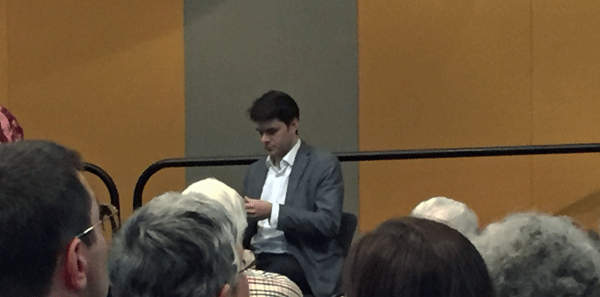Nicholas Carter in Conversation

(Bradley Forum, Adelaide, March 2016)
[ASO Chief Conductor Nicholas Carter in conversation with Jacinta Thompson]TVC attended this important discussion at Uni SA last evening, in the “Bob Hawke Prime Ministerial Centre”, a think-tank with the mission of “strengthening our democracy – valuing our diversity – building our future”. (As to these aims, one could not help hearken back to the imbroglio of Bob’s many failed attempts to impose the Australia Card on us, but let that pass!)
The central text was the relevance of the orchestra in the 21st Century – which recalls the golden moment from The Ploughman’s Lunch, when the earnest fellow at the poetry reading asks “What is the Poet’s role in society today?” (see below). There is no short answer to this, but Mr.Carter mused impressively on the topic and brought in a few related issues during a most stimulating discussion. He is passionate about not only preserving, but boosting, the great classics, such as Beethoven (7 et al), the works of Bach, Wagner, Mahler – all the biggies.
Simon Rattle called for increased musical education (which, on the evidence, might also enhance our diminishing skills in maths) but no-one has worked-out the role of the 21C conductor either in that specific role or in general. Carter pointed out an obvious but hitherto inchoate truth, that the German national revival from the ruins of Nazism was principally cultural – a potent thought. Carter asked: “What makes a city sparkle…and have a personality?” – and wondered if large swathes of society were isolated from our cultural heritage, western cultural products could defeat barbarism.
He also touched on the eternal truth that there is nothing like being there. Whilst we have our hi-fi recordings and DVDs – the digital age brings us ever more content (perhaps more than one would want) yet the thrill of attending the concert hall or opera house ‘live’ cannot be matched by machines, at least to date. Carter drew a sharp analogy here – attending a cathedral or a hallowed sporting ground – to demonstrate that live group attendance is also a sociological event, and one of immeasurable social value.
Nicholas Carter spoke of his early education, learning violin and piano from age 7, his account punctuated by musical squeaks of his young daughter, Claudia, at the rear of the auditorium (his young child, killing schedule and constant flights OS and back explaining his chronic cough). He had interesting things to say about culture and education, the inspiration we draw from music, and its therapeutic effect. Whilst Jacinta Thompson weighed in on this aspect with some interesting examples, such as the work being done by the Manchester Camerata (which has been previously conducted by, among others, Nicholas Braithwaite, who was in last night’s audience) for people living with dementia, Carter had less in mind Vertigo-style music therapy; he was rather directing his thoughts to the inner glow that great music can give all of us, to cure our world-weariness.
In this context, he played An die Musick, a short Schubert piece sung by the famous lieder singer and Schubert expert, Ian Bostridge (note there is a forthcoming review of his book on Schubert’s Winter Journey on this site) the Wikipedia translation of which is:
You, lovely art, in how many grey hours,
When life’s mad tumult wraps around me,
Have you kindled my heart to warm love,
Have you transported me into a better world,
Transported into a better world!
Often has a sigh flowing out from your harp,
A sweet, divine harmony from you
Unlocked to me the heaven of better times,
You, lovely Art, I thank you for it!!
You, lovely art, I thank you!
Furthermore, he recalled Shakespeare’s Sonnet 65:
Since brass, nor stone, nor earth, nor boundless sea,
But sad mortality o’ersways their power,
How with this rage shall beauty hold a plea,
Whose action is no stronger than a flower?
That was really a plea of his own – one struggles to imagine someone such as Martin Amis’ Lionel Asbo, having heard a Brahms suite, forswearing narcotics and recreational violence. This may seem snobbish and it may well be unduly pessimistic, but we sadly conclude that it is true.
Which means those who stand up for the canon (and we mean the Canon to all diverse points West, East, South and North) have to step up as well! Time for some tin rattling so we can get a decent opera house and concert hall! We note that the papers have today published a list of top companies who have paid $2 billion in income tax in 2014, suggesting that the government might hand out tax breaks and divert some of that cash towards the cultural commonweal?
(“What is the Poet ‘s role in society today?”
Leave a comment...
While your email address is required to post a comment, it will NOT be published.


0 Comments